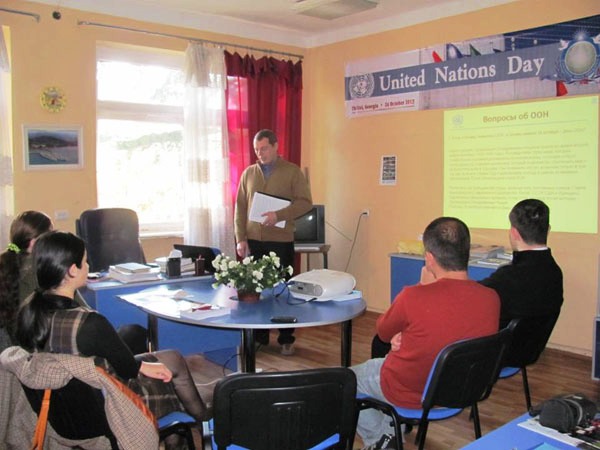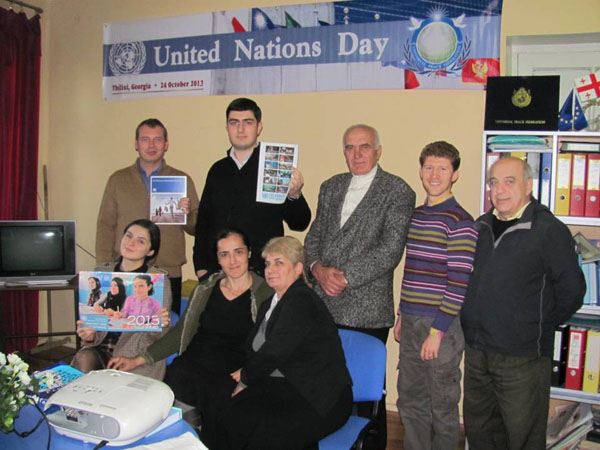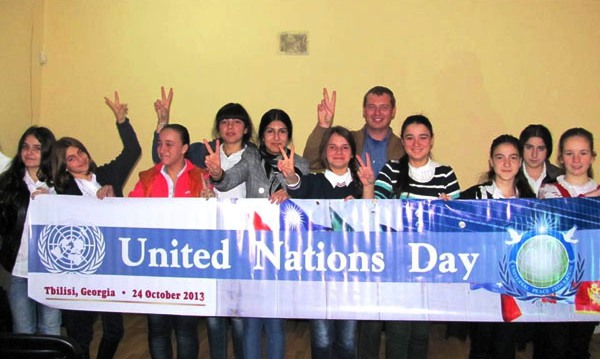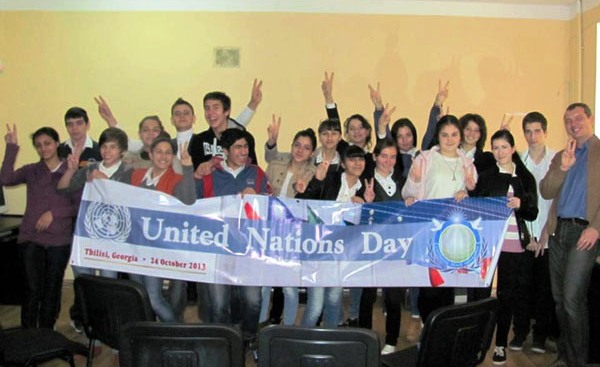![]()
The Words of the Maksimov Family
|
|
The Words of the Maksimov Family |

Tbilisi, Georgia -- UPF-Georgia commemorated United Nations Day -- the anniversary of the adoption of the Charter of the United Nations -- at several educational events for students in the capital, Tbilisi, in October.
Ninth- and 10th-grade pupils at Secondary School No. 136 learned how the United Nations officially came into existence on Oct. 24, 1945, in a program titled "Basic Facts about the United Nations." UPF-Georgia organized the program, which took place on Oct. 24, in partnership with the United Nations' Georgia office and the school administration.
After listening to a message written for the occasion by UN Secretary-General Ban Ki-moon, the pupils expressed their approval of the ways in which the United Nations contributes to peace and common progress. They pledged to work together for a better world and to ensure peace, development and human rights.
The pupils took a quiz on the purpose, aims and basic structure of the United Nations and were rewarded with calendars and printed materials provided by the UN office.

A role-playing exercise, "Five Principles of Peace," enabled NGO leaders and students to learn about UN activities and to practice reaching agreements through compromise. The exercise was the highlight of a program held Oct. 26 at the UPF-Georgia office in Tbilisi.
"Five Principles of Peace," developed by Evgeny Skvortsov of the Ural branch of UPF-Russia, already had been played on several occasions in Georgia, Russia and other countries.
The meeting started with a presentation on UN history and global issues, followed by a quiz. The top scorers on the quiz received T-shirts, calendars and books provided by the United Nations' Georgia office.
Next, the guests took part in a Model UN session. Role-playing members of three chambers -- "politicians," "religious leaders" or "social activists" -- they were given the task of answering five fundamental questions about human existence and development and about making a better world:
1) What idea can unite all peoples?
2) What defines the value of each human being?
3) What should be the standard of our relationships?
4) What is the best environment for learning the ethics of relationships?
5) How can peace between nations be achieved?

After lively discussions, the chambers adopted the following joint proposals:
1) Humanity is a commonwealth of people with equal rights, striving for common prosperity and united by universally shared values and principles.
2) Humans, as the highest rationally thinking beings, struggle to attain happiness, peace and development.
3) The standard for human relationships is living for the sake of others.
4) The traditional family based on true love, in which three generations live together, is the best school of love and relationships.
5) To create peace, human rights should be protected; international and inter-religious marriages should be promoted and supported; and an inter-religious council should be created in each nation for the inclusion of religious voices at the highest levels of world governance.

After these proposals were announced, they were compared to the results of similar exercises in the past -- performed by high school students in the Russian city of Yekaterinburg, participants in a volunteer project at Siberia's Lake Baikal, and students and NGO leaders meeting in Tbilisi in 2011 -- as well as to the Universal Peace Federation's five peace principles.
It is significant that people of different age groups and social backgrounds respond similarly to these five questions. This indicates that these are core universal principles which can establish the common ground for cooperation and peaceful behavior among diverse peoples. The application of these fundamental peace principles is the path to lasting peace.